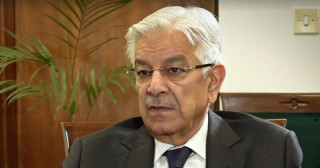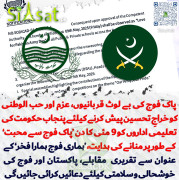Syed Haider Imam
Chief Minister (5k+ posts)
Aug 05 2015
Ex-minister, four others remanded in NAB custody
ESHAWAR: An accountability court on Tuesday remanded four persons, including former provincial minister Makhdum Murid Kazim, in the custody of the National Accountability Bureau for nine days in a case of alleged illegal transfer of precious government land to the Naval Families Rehabilitation Organisation (NFRO) and other individuals.
The judge Mohammad Ibrahim Khan directed that the four suspects -- Murid Kazim, the then district officer (revenue & estate) currently posted as assistant commissioner Lakki Marwat, Qayyum Nawaz, district officer revenue and estate Riaz Mohammad, and an assistant at the board of revenue department, Gul Hassan -- should be again produced on Aug 13.
NAB prosecutors Danyal Chamkani and Riaz Mohmand stated that the suspect Murid Kazim in connivance with the other three officials illegally transferred valuable state land measuring 1,976 Kanals situated in DI Khan to NFRO in 2010. Subsequently, he also unlawfully transferred 182 Kanals of residential land to officers of revenue department as kickbacks.
They said in 2009 the director NFRO, Bahawalpur, sent an application stating that about 1,976 Kanals of land allotted to Pakistan Navy in DI Khan was not cultivable therefore it should be exchanged with better and cultivable land.
The NAB prosecutors claimed as per rules, allotment of alternate land was the prerogative of chief minister of the province, but the suspect Murid Kazim being revenue minister abused his authority and directed the provincial board of revenue to put up note for allotment of alternate land to NFRO Bahawalpur and gave illegal approval to the transfer of 1,976 Kanal of land to the organisation.
They alleged that the suspect Riaz Mohammad allegedly included valuable commercial and residential properties in the proposal which were later on illegally allotted to officers and officials of revenue department.
Published in Dawn, August 5th, 2015
http://www.dawn.com/news/1198499/ex-minister-four-others-remanded-in-nab-custody
Crisis in sight as UN agencies phasing out relief for IDPs

PESHAWAR: The UN agencies are gradually ‘phasing out’ relief activities for internally displaced persons (IDPs) from Fata due to inadequate funding and restriction on access of humanitarian staff.
Official sources told Dawn that the Unicef had already abandoned activities at Togh Sri Camp in Hangu district and Jalozai Camp in Nowshera district.
They said the Unicef had stopped running education and child protection programmes in both areas due to shortage of resources.
A staff member of the UNHCR Peshawar offices told Dawn that the flow of funds for IDPs had dwindled humanitarian activities since the international community shifted focus from Pakistan to Syria and subsequently relief agencies had started abandoning operations.
“Definitely funding is an issue, which is affecting relief activities,” the official said, adding like Unicef, UNHCR will also stop assisting IDPs.
The UNHCR has been providing shelter and non-food items to IDPs living in camps and with host families in Khyber Pakhtunkhwa.
Shortage of funds, restriction on workers to blame
In a statement, the United Nations Office for the Coordination of Humanitarian Affairs (UNOCHA) said the humanitarian community had received $197 million against the required amount of $433 million to fund relief programmes for IDPs.
The statement issued on Tuesday said the humanitarian community launched the Humanitarian Strategic Plan in January 2015 to support the displaced and returning families.
“The plan aims to mobilise $433 million. So far, only $197 million has been secured and out of it, the government of Pakistan has contributed around $60 million in wheat through the World Food Programme,” the statement said.
The looming financial crises have worried humanitarian agencies as well as local authorities about the future of IDPs. Various humanitarian agencies, including international non-governmental organisations, have been assisting around 283,463 displaced families from Fata.
Currently, return of IDPs to Khyber and North and South Waziristan agencies is underway.
The government has worked out a tentative plan to send all IDPs back to their homes in Fata by the end of 2016. However, the repatriation process is moving ahead at a slow pace, especially for North and South Waziristan agencies.
Officials said only 4,000 of the total of 102,566 North Waziristan families verified by the National Database and Registration Authority had returned to their homes since March 31 this year.
“Return of IDPs may not complete by the end of 2016 keeping in view the slow process of repatriation as military operation is still going on in some areas,” said an official.
He said the UN had been running the entire relief operation and that shortage of funds might create crises if humanitarian agencies abandoned jobs as the government had no resources to fulfil basic needs of IDPs.
The UNOCHA statement said the need assessment carried out in Bara area of Khyber Agency showed that nearly one third of Bara returnees didn’t have access to health facilities; child malnutrition rates were at ‘emergency level’, and there were large-scale damages to physical infrastructure, including school buildings.
It said the returning IDPs needed assistance to rebuild their houses and livelihoods, while support was required to ensure provision of health, education and other services.
Separately, the UNHCR is winding up relief activities at Togh Sri Camp from August 31 due to restriction on the movement of its local and expatriate staff members.
Officials said the UNHCR staff had been denied access to the camp for the last one year due to security reasons and that the Fata Disaster Management Authority had been informed about it.
The camp is hosting displaced families from parts of Orakzai and Kurram agencies, which have not been de-notified as conflict zones.
Officials said Togh Sri was not safe for the workers of international humanitarian bodies and therefore, authorities had restricted their access to the area.
Following intimation from the UN refugee agency, the FDMA had started relocation of 84 displaced families to New Durrani Camp in Kurram Agency.
A proposal is under consideration to relocate 700 families, which belong to upper and lower tehsils of Orakzai Agency, from Togh Sri to Jalozai Camp.
“Our staff has not been allowed to visit Togh Sri for the last one year, which forced the UN agency to abandon operation there,” said a humanitarian worker dealing with IDPs.
He said UNHCR would close relief operation by the end of August whether the government relocated IDPs from Togh Sri or not.
Published in Dawn, August 5th, 2015
http://www.dawn.com/news/1198501/crisis-in-sight-as-un-agencies-phasing-out-relief-for-idps
CM orders waste disposal plan
PESHAWAR: Khyber Pakhtunkhwa Chief Minister Pervez Khattak on Tuesday directed the authorities concerned to prepare an integrated plan for waste collection and disposal to ensure clean environment in the province.
Talking to a group of international consultants here, he said his government had already started work on the cleanliness, waste collection and its safe disposal to ensure clean environment in urban centres, particularly in Peshawar.
Mr Khattak said in future the tehsil municipal administrations would collect waste and dispose it from the urban centres, adding villages were equally dirty, posing environmental threat and thus their cleaning was a must.
The chief minister said land had already been acquired for waste disposal in Peshawar and the programme would soon be practically launched. However, he said there was dire need of proper recycling of the waste for energy generation and water conservation.
He said he had directed to carry out an integrated study to earn from carbon credit by controlling the production of carbon, methane and other ozone gases.
Mr Khattak said in view of the worsening global climatic conditions and the challenges they posed, his government had launched a programme to plant a billion saplings in the province. He said over 250 million saplings would be planted this year.
Mr Luis Fernandes-Reyes of Senamco UAE, Mohammad Faisal Janjua of PAL Group, Brig (r) Saeed Sharif of Sundus industrial zones, environmentalists Mohammad Bilal, Col Shahid, principal secretary to chief minister Dr Shahzad Khan Bangash and secretary local government and rural development Jameel Ahmed were in attendance.
Published in Dawn, August 5th, 2015
http://www.dawn.com/news/1198498/cm-orders-waste-disposal-plan
KP yet to announce health policy
ESHAWAR: The Khyber Pakhtunkhwa government is yet to announce health policy and set forth its goals and objectives in line with its manifesto and national and international commitments, experts say.
They said that the province needed its own health policy especially after the passage of 18th Amendment as it made health a provincial subject. The government was required to formulate its own policy and implement the same, they added.
The experts said that before the passage of 18th Amendment in 2010, the provinces received guidelines from federal government regarding health programmes. Although the federal government didn’t have any policy since 1994, yet it managed health affairs in line with laws drafted from time to time, they said.
“The province’s health system is being run on Health Sector Strategy (2010-2017), which is not substitute to a proper policy,” they said. They added that federal government started an exercise to facilitate the provincial governments to develop their respective policies with a view to utilise their resources in a systematic manner. Early this week, a meeting of all health officials from the entire province took place wherein they were asked to initiate work on the policies.
The PTI-led government is bringing about amendments in health-related laws to improve patients’ care in the province but it is yet to take measures to formulate a comprehensive policy and outline its mechanism to address the health-related issues.
Experts say the province needs its own policy after passage of 18th Amendment
In some health areas, such as Expanded Programme on Immunisation, Maternal Neonatal Child Health, Emergency Care, Primary and Secondary Healthcare, the government required a policy as to how to cope with the situation.
The government has failed to meet the Millennium Development Goals set forth by the United Nations to be met by December 2015. Now, the 8 MDGs will get replaced by the UN Sustainable Development Goals under which the countries have been asked to meet the 17 goals by 2030.
A comprehensive health policy will also attract international donor agencies, which want to give technical as well as financial assistance to the government help it meet the SDGs. Many donor organisations want to help the violence-stricken province and improve health indicators but they are waiting for a clear indication about government’s plan regarding the desired goals.
Not only SDGs but donors can be attracted by adopting a written policy to get strengthened its existing system and boost up of healthcare facilities.
According to experts, the government will be able to know about its exact number of quantum of diseases, allocation of resources and available facilities and human resources, once it puts in place a policy an explain its vision on how to deal with the issues.
“Under a policy, the government can go for construction of more hospitals, medical colleges and other institutions in a planned manner,” they said. Presently, there is no systematic approach to pool the resources and improve health system through judicious allocation of resources.
For instance, there are facilities like MRI, CT scanners etc at the district headquarters hospitals but the patients come to Peshawar due to non-availability of specialist doctors there. Most of the specialist doctors are concentrated in Peshawar for years and the people in other districts face problem in getting their services there.
Owing to absence of health policy, the provincial government doesn’t know about its progress on the MDGs. Most of the doctors and staff are employed in urban areas while most people live in rural areas.
By putting in place a policy, the government would be able to know about its progress and weaknesses and take further steps for improvement. Currently, reliance of government seems on a few teaching hospitals and leaving aside the improvement of the entire health infrastructure.
Published in Dawn, August 5th, 2015
http://www.dawn.com/news/1198507/kp-yet-to-announce-health-policy
Govt asked not to shut maktab schools
TIMERGARA: Local residents on Tuesday urged the Khyber Pakhtunkhwa government to reverse the decision of shutting down maktab primary schools across the province.
Talking to journalists here, Jamaat-i-Islami local leader Bakhtawar Syed and others said the government was making tall claims to provide basic education to every child, but it closed doors of education on children of far flung and remote areas.
They said the government planned to shut a total of 130 maktab primary schools in Lower Dir, which had been providing education to more than 800 students in different parts of the district.
The schools were opened in areas where there were no schools for boys and girls, an official of local education department told Dawn, adding some of these schools had been running for the last 15 years.
The district officer education Mohammad Riaz said shutting maktab schools was a provincial decision.
However, he said the education department had been receiving complaints that these schools were being run by a single teacher at local mosque or hujra.
Meanwhile, the All Teachers Coordination council during a meeting chaired by its provincial president Syed Mohammad Shah on Tuesday demanded of the Khyber Pakhtunkhwa government to include teachers from grade 7 to 16 in its recently announced upgradation policy.
The participants threatened to agitate if teachers were deprived of upgradation.
WORKERS JOIN PTI: Dozens of ANP and JI workers, including a village councilor, announced to quit their parties and join the Pakistan Tehreek-i-Insaf, at a function in Rabat on Tuesday.
On the occasion, the new entrants claimed the Khyber Pakhtunkhwa government had controlled corruption, lawlessness, and eradicated the ‘thana’ and ‘patwari’ culture.
OFFICE-BEARERS: Badshah Munir was elected president, Javid Iqbal vice president and Ikram Khan general secretary, respectively, during the elections of the local chemist and druggists’ association on Tuesday. Other office-bearers would be chosen by the elected representatives.
Published in Dawn, August 5th, 2015
http://www.dawn.com/news/1198524/govt-asked-not-to-shut-maktab-schools

Ex-minister, four others remanded in NAB custody
ESHAWAR: An accountability court on Tuesday remanded four persons, including former provincial minister Makhdum Murid Kazim, in the custody of the National Accountability Bureau for nine days in a case of alleged illegal transfer of precious government land to the Naval Families Rehabilitation Organisation (NFRO) and other individuals.
The judge Mohammad Ibrahim Khan directed that the four suspects -- Murid Kazim, the then district officer (revenue & estate) currently posted as assistant commissioner Lakki Marwat, Qayyum Nawaz, district officer revenue and estate Riaz Mohammad, and an assistant at the board of revenue department, Gul Hassan -- should be again produced on Aug 13.
NAB prosecutors Danyal Chamkani and Riaz Mohmand stated that the suspect Murid Kazim in connivance with the other three officials illegally transferred valuable state land measuring 1,976 Kanals situated in DI Khan to NFRO in 2010. Subsequently, he also unlawfully transferred 182 Kanals of residential land to officers of revenue department as kickbacks.
They said in 2009 the director NFRO, Bahawalpur, sent an application stating that about 1,976 Kanals of land allotted to Pakistan Navy in DI Khan was not cultivable therefore it should be exchanged with better and cultivable land.
The NAB prosecutors claimed as per rules, allotment of alternate land was the prerogative of chief minister of the province, but the suspect Murid Kazim being revenue minister abused his authority and directed the provincial board of revenue to put up note for allotment of alternate land to NFRO Bahawalpur and gave illegal approval to the transfer of 1,976 Kanal of land to the organisation.
They alleged that the suspect Riaz Mohammad allegedly included valuable commercial and residential properties in the proposal which were later on illegally allotted to officers and officials of revenue department.
Published in Dawn, August 5th, 2015
http://www.dawn.com/news/1198499/ex-minister-four-others-remanded-in-nab-custody
Crisis in sight as UN agencies phasing out relief for IDPs

PESHAWAR: The UN agencies are gradually ‘phasing out’ relief activities for internally displaced persons (IDPs) from Fata due to inadequate funding and restriction on access of humanitarian staff.
Official sources told Dawn that the Unicef had already abandoned activities at Togh Sri Camp in Hangu district and Jalozai Camp in Nowshera district.
They said the Unicef had stopped running education and child protection programmes in both areas due to shortage of resources.
A staff member of the UNHCR Peshawar offices told Dawn that the flow of funds for IDPs had dwindled humanitarian activities since the international community shifted focus from Pakistan to Syria and subsequently relief agencies had started abandoning operations.
“Definitely funding is an issue, which is affecting relief activities,” the official said, adding like Unicef, UNHCR will also stop assisting IDPs.
The UNHCR has been providing shelter and non-food items to IDPs living in camps and with host families in Khyber Pakhtunkhwa.
Shortage of funds, restriction on workers to blame
In a statement, the United Nations Office for the Coordination of Humanitarian Affairs (UNOCHA) said the humanitarian community had received $197 million against the required amount of $433 million to fund relief programmes for IDPs.
The statement issued on Tuesday said the humanitarian community launched the Humanitarian Strategic Plan in January 2015 to support the displaced and returning families.
“The plan aims to mobilise $433 million. So far, only $197 million has been secured and out of it, the government of Pakistan has contributed around $60 million in wheat through the World Food Programme,” the statement said.
The looming financial crises have worried humanitarian agencies as well as local authorities about the future of IDPs. Various humanitarian agencies, including international non-governmental organisations, have been assisting around 283,463 displaced families from Fata.
Currently, return of IDPs to Khyber and North and South Waziristan agencies is underway.
The government has worked out a tentative plan to send all IDPs back to their homes in Fata by the end of 2016. However, the repatriation process is moving ahead at a slow pace, especially for North and South Waziristan agencies.
Officials said only 4,000 of the total of 102,566 North Waziristan families verified by the National Database and Registration Authority had returned to their homes since March 31 this year.
“Return of IDPs may not complete by the end of 2016 keeping in view the slow process of repatriation as military operation is still going on in some areas,” said an official.
He said the UN had been running the entire relief operation and that shortage of funds might create crises if humanitarian agencies abandoned jobs as the government had no resources to fulfil basic needs of IDPs.
The UNOCHA statement said the need assessment carried out in Bara area of Khyber Agency showed that nearly one third of Bara returnees didn’t have access to health facilities; child malnutrition rates were at ‘emergency level’, and there were large-scale damages to physical infrastructure, including school buildings.
It said the returning IDPs needed assistance to rebuild their houses and livelihoods, while support was required to ensure provision of health, education and other services.
Separately, the UNHCR is winding up relief activities at Togh Sri Camp from August 31 due to restriction on the movement of its local and expatriate staff members.
Officials said the UNHCR staff had been denied access to the camp for the last one year due to security reasons and that the Fata Disaster Management Authority had been informed about it.
The camp is hosting displaced families from parts of Orakzai and Kurram agencies, which have not been de-notified as conflict zones.
Officials said Togh Sri was not safe for the workers of international humanitarian bodies and therefore, authorities had restricted their access to the area.
Following intimation from the UN refugee agency, the FDMA had started relocation of 84 displaced families to New Durrani Camp in Kurram Agency.
A proposal is under consideration to relocate 700 families, which belong to upper and lower tehsils of Orakzai Agency, from Togh Sri to Jalozai Camp.
“Our staff has not been allowed to visit Togh Sri for the last one year, which forced the UN agency to abandon operation there,” said a humanitarian worker dealing with IDPs.
He said UNHCR would close relief operation by the end of August whether the government relocated IDPs from Togh Sri or not.
Published in Dawn, August 5th, 2015
http://www.dawn.com/news/1198501/crisis-in-sight-as-un-agencies-phasing-out-relief-for-idps
CM orders waste disposal plan
PESHAWAR: Khyber Pakhtunkhwa Chief Minister Pervez Khattak on Tuesday directed the authorities concerned to prepare an integrated plan for waste collection and disposal to ensure clean environment in the province.
Talking to a group of international consultants here, he said his government had already started work on the cleanliness, waste collection and its safe disposal to ensure clean environment in urban centres, particularly in Peshawar.
Mr Khattak said in future the tehsil municipal administrations would collect waste and dispose it from the urban centres, adding villages were equally dirty, posing environmental threat and thus their cleaning was a must.
The chief minister said land had already been acquired for waste disposal in Peshawar and the programme would soon be practically launched. However, he said there was dire need of proper recycling of the waste for energy generation and water conservation.
He said he had directed to carry out an integrated study to earn from carbon credit by controlling the production of carbon, methane and other ozone gases.
Mr Khattak said in view of the worsening global climatic conditions and the challenges they posed, his government had launched a programme to plant a billion saplings in the province. He said over 250 million saplings would be planted this year.
Mr Luis Fernandes-Reyes of Senamco UAE, Mohammad Faisal Janjua of PAL Group, Brig (r) Saeed Sharif of Sundus industrial zones, environmentalists Mohammad Bilal, Col Shahid, principal secretary to chief minister Dr Shahzad Khan Bangash and secretary local government and rural development Jameel Ahmed were in attendance.
Published in Dawn, August 5th, 2015
http://www.dawn.com/news/1198498/cm-orders-waste-disposal-plan
KP yet to announce health policy
ESHAWAR: The Khyber Pakhtunkhwa government is yet to announce health policy and set forth its goals and objectives in line with its manifesto and national and international commitments, experts say.
They said that the province needed its own health policy especially after the passage of 18th Amendment as it made health a provincial subject. The government was required to formulate its own policy and implement the same, they added.
The experts said that before the passage of 18th Amendment in 2010, the provinces received guidelines from federal government regarding health programmes. Although the federal government didn’t have any policy since 1994, yet it managed health affairs in line with laws drafted from time to time, they said.
“The province’s health system is being run on Health Sector Strategy (2010-2017), which is not substitute to a proper policy,” they said. They added that federal government started an exercise to facilitate the provincial governments to develop their respective policies with a view to utilise their resources in a systematic manner. Early this week, a meeting of all health officials from the entire province took place wherein they were asked to initiate work on the policies.
The PTI-led government is bringing about amendments in health-related laws to improve patients’ care in the province but it is yet to take measures to formulate a comprehensive policy and outline its mechanism to address the health-related issues.
Experts say the province needs its own policy after passage of 18th Amendment
In some health areas, such as Expanded Programme on Immunisation, Maternal Neonatal Child Health, Emergency Care, Primary and Secondary Healthcare, the government required a policy as to how to cope with the situation.
The government has failed to meet the Millennium Development Goals set forth by the United Nations to be met by December 2015. Now, the 8 MDGs will get replaced by the UN Sustainable Development Goals under which the countries have been asked to meet the 17 goals by 2030.
A comprehensive health policy will also attract international donor agencies, which want to give technical as well as financial assistance to the government help it meet the SDGs. Many donor organisations want to help the violence-stricken province and improve health indicators but they are waiting for a clear indication about government’s plan regarding the desired goals.
Not only SDGs but donors can be attracted by adopting a written policy to get strengthened its existing system and boost up of healthcare facilities.
According to experts, the government will be able to know about its exact number of quantum of diseases, allocation of resources and available facilities and human resources, once it puts in place a policy an explain its vision on how to deal with the issues.
“Under a policy, the government can go for construction of more hospitals, medical colleges and other institutions in a planned manner,” they said. Presently, there is no systematic approach to pool the resources and improve health system through judicious allocation of resources.
For instance, there are facilities like MRI, CT scanners etc at the district headquarters hospitals but the patients come to Peshawar due to non-availability of specialist doctors there. Most of the specialist doctors are concentrated in Peshawar for years and the people in other districts face problem in getting their services there.
Owing to absence of health policy, the provincial government doesn’t know about its progress on the MDGs. Most of the doctors and staff are employed in urban areas while most people live in rural areas.
By putting in place a policy, the government would be able to know about its progress and weaknesses and take further steps for improvement. Currently, reliance of government seems on a few teaching hospitals and leaving aside the improvement of the entire health infrastructure.
Published in Dawn, August 5th, 2015
http://www.dawn.com/news/1198507/kp-yet-to-announce-health-policy
Govt asked not to shut maktab schools
TIMERGARA: Local residents on Tuesday urged the Khyber Pakhtunkhwa government to reverse the decision of shutting down maktab primary schools across the province.
Talking to journalists here, Jamaat-i-Islami local leader Bakhtawar Syed and others said the government was making tall claims to provide basic education to every child, but it closed doors of education on children of far flung and remote areas.
They said the government planned to shut a total of 130 maktab primary schools in Lower Dir, which had been providing education to more than 800 students in different parts of the district.
The schools were opened in areas where there were no schools for boys and girls, an official of local education department told Dawn, adding some of these schools had been running for the last 15 years.
The district officer education Mohammad Riaz said shutting maktab schools was a provincial decision.
However, he said the education department had been receiving complaints that these schools were being run by a single teacher at local mosque or hujra.
Meanwhile, the All Teachers Coordination council during a meeting chaired by its provincial president Syed Mohammad Shah on Tuesday demanded of the Khyber Pakhtunkhwa government to include teachers from grade 7 to 16 in its recently announced upgradation policy.
The participants threatened to agitate if teachers were deprived of upgradation.
WORKERS JOIN PTI: Dozens of ANP and JI workers, including a village councilor, announced to quit their parties and join the Pakistan Tehreek-i-Insaf, at a function in Rabat on Tuesday.
On the occasion, the new entrants claimed the Khyber Pakhtunkhwa government had controlled corruption, lawlessness, and eradicated the ‘thana’ and ‘patwari’ culture.
OFFICE-BEARERS: Badshah Munir was elected president, Javid Iqbal vice president and Ikram Khan general secretary, respectively, during the elections of the local chemist and druggists’ association on Tuesday. Other office-bearers would be chosen by the elected representatives.
Published in Dawn, August 5th, 2015
http://www.dawn.com/news/1198524/govt-asked-not-to-shut-maktab-schools
























































































